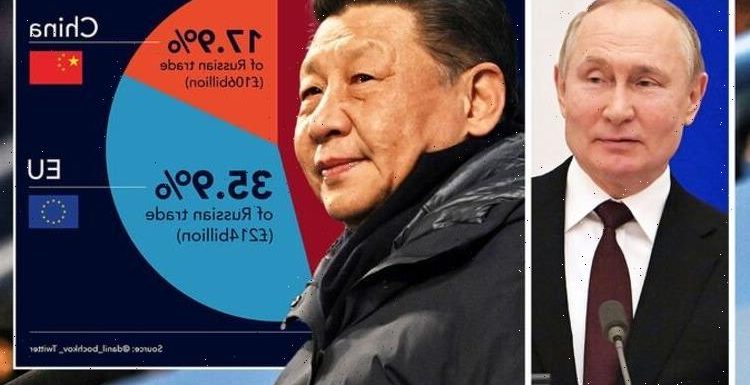
Russian ruble falls to all-time low following economic sanctions
We use your sign-up to provide content in ways you’ve consented to and to improve our understanding of you. This may include adverts from us and 3rd parties based on our understanding. You can unsubscribe at any time. More info
EU ministers are meeting today to discuss a fifth round of sanctions to further batter the Russian economy. Russia is hugely reliant on the EU as a trading partner, particularly over energy as it supplies 40 percent of its gas. Over the last few weeks, the bloc has appeared increasingly willing to scupper energy ties with Putin, publishing an energy strategy detailing the plan to slash oil and gas imports by two thirds by the end of the year.
This could spark panic for Russia, which has seen its profits soar while global energy prices skyrocket.
But the West slipping away as a partner, analysts have tipped that Russia could cosy up with China, which has yet to strictly condemn Putin’s invasion of Ukraine.
Danil Bochkov, from the Russian International Affairs Council, tweeted: “Those countries that joined anti-Russian sanctions accounted for over 54 percent of Russian trade in 2021.
“Russia’s main trading partner has been EU: in 2021, it accounted for 35.9 percent of Russian trade – $282 billion (£214billion).
“China’s share is two times less at 17.9% percent – $140.7 billion (£106billion).”


Several EU countries are now calling for the harshest possible sanctions to hammer the final into the coffin of the Russian economy.
Polish Prime Minister Mateusz Morawiecki is pushing for a total trade ban.
He said: “Poland is proposing to add a trade blockade to this package of sanctions as soon as possible, [including] both of its seaports … but also a ban on land trade.
“Fully cutting off Russia’s trade would further force Russia to consider whether it would be better to stop this cruel war.”
Germany, one of the most reliant of the bunch as Russia supplies around 40 percent of its gas imports, is reportedly pushing back against the calls for energy sanctions.

German Vice-Chancellor Robert Habeck said on public radio DLF on March 19 that completely slashing Russian energy imports could mean a “three percent to five percent loss of GDP”, which would lead to “some people no longer earning any money at all”.
He added: “And these some people are very, very many”.
But as the West looks to part ways with China, Russia argued that it can save it from collapse.
Russian Finance Minister Anton Siluanov said: “I think that our partnership with China will still allow us to maintain the cooperation that we have achieved, and not only maintain, but also increase it in an environment where Western markets are closing.”
And China may appear willing to help out.
DON’T MISS
Putin blinks first: Bumper gas supplies sent to EU [REPORT]
Putin sent horror warning over next Ukraine move: ‘WW3!’ [INSIGHT]
Putin bowel cancer speculation fuelled by ‘Moon face’ fears [REVEAL]

The pair have struck a gas deal for the Power of Siberia gas pipeline that could double Russia’s exports to China.
The new system could transport up to fifty billion cubic metres more natural gas every year, it seemed as though Putin had come up with a master plan.
China has also relaxed its restriction on imports of Russian wheat.
Experts have said the move would bring a boost to both countries.
The agreement provides Russia with a secure buyer when exports to other countries are impacted by sanctions, while China would get a boost in agricultural production and could diversify its imports, something China’s President Xi Jinping is keen on.

Analysts from Goldman Sachs wrote in a research report: “Uncertainty around potential sanctions is beginning to create a potential supply shock.
“In our view, until the uncertainty around the rapidly escalating situation is resolved, commodity price risk remains skewed to the upside, with further escalation likely to send European natural gas, wheat, corn and oil prices higher from already-elevated levels.”
The analysts said that because of this, Russian commodities and raw materials will likely be “redirected to China” as the West stops importing from Russia.
Source: Read Full Article